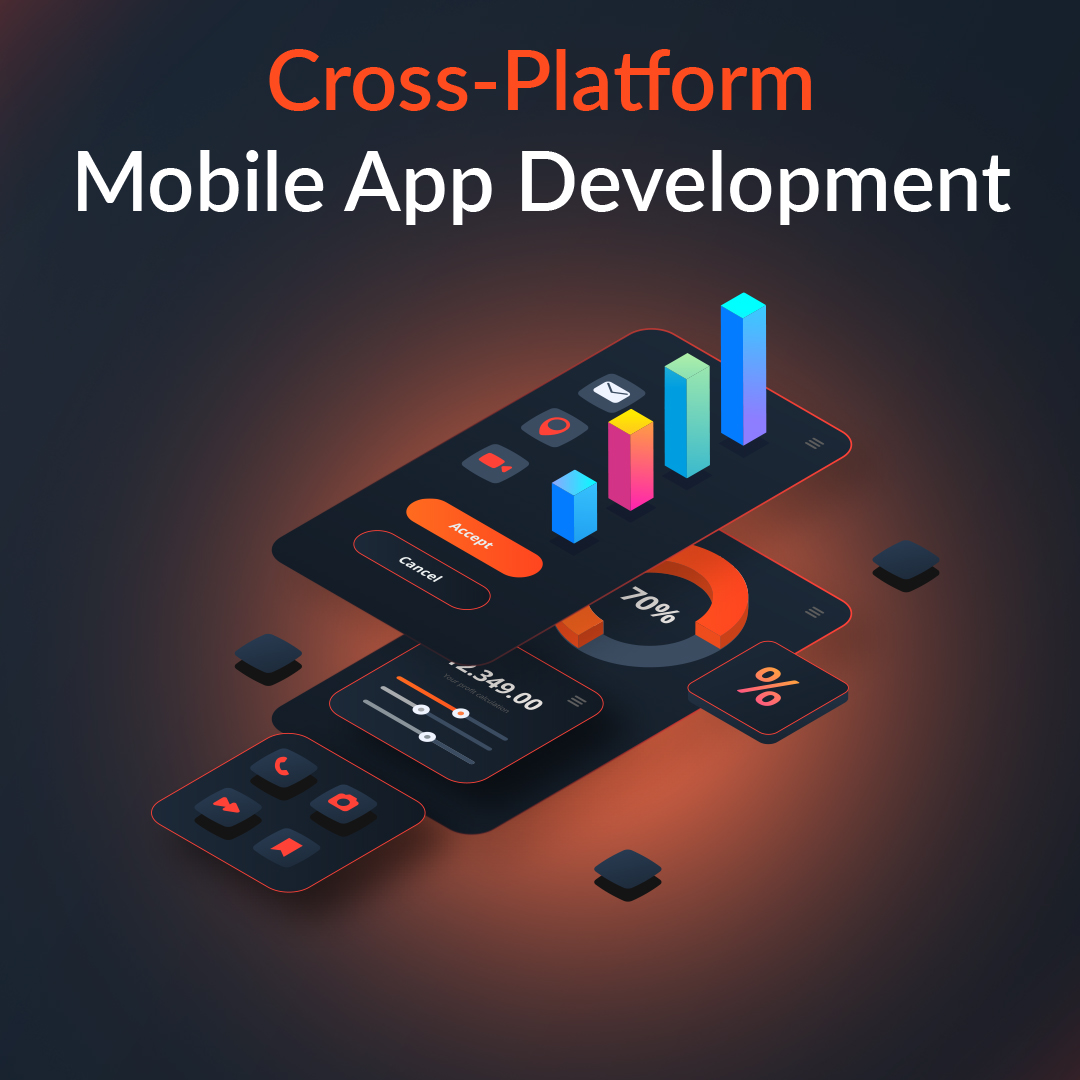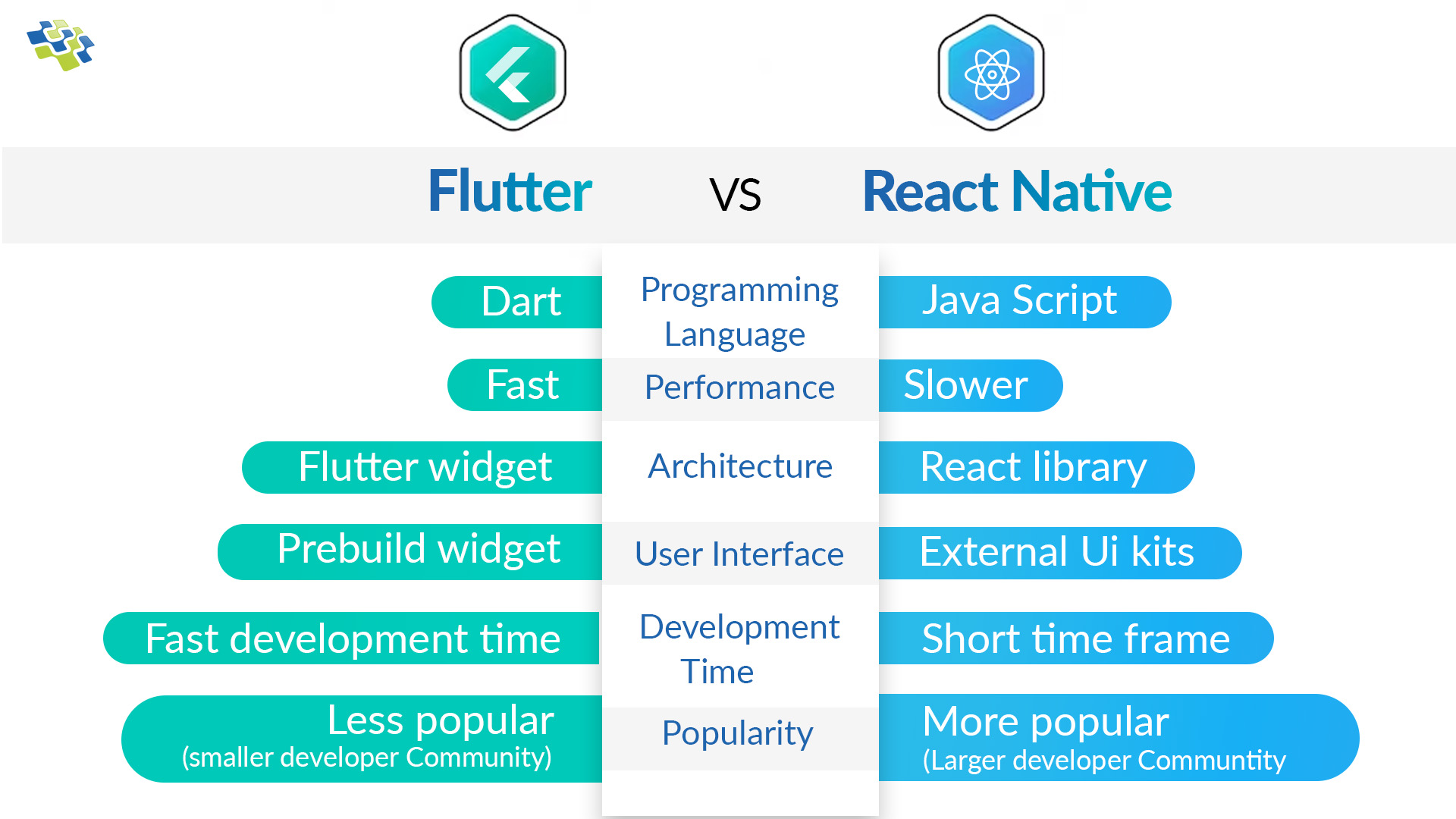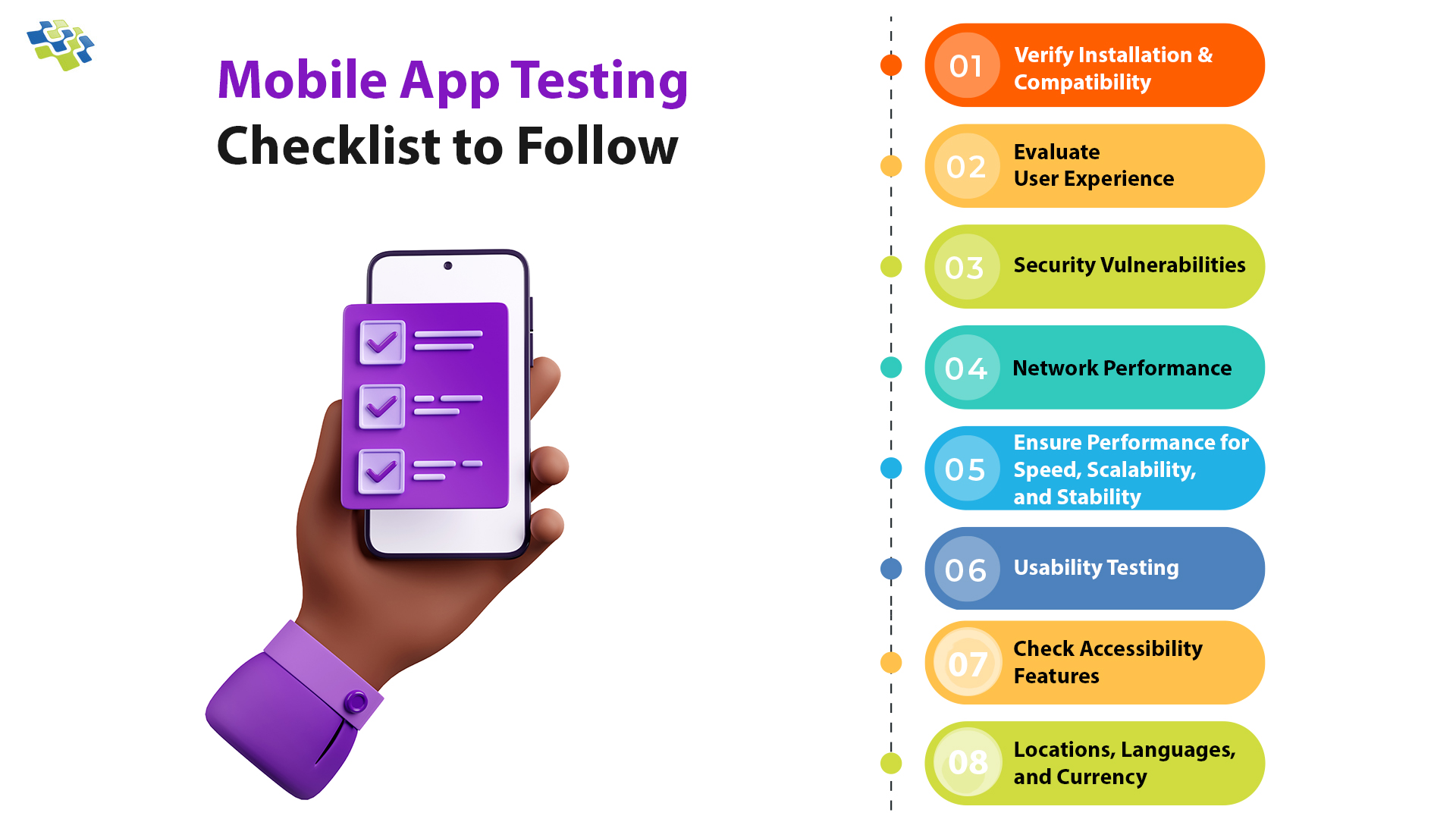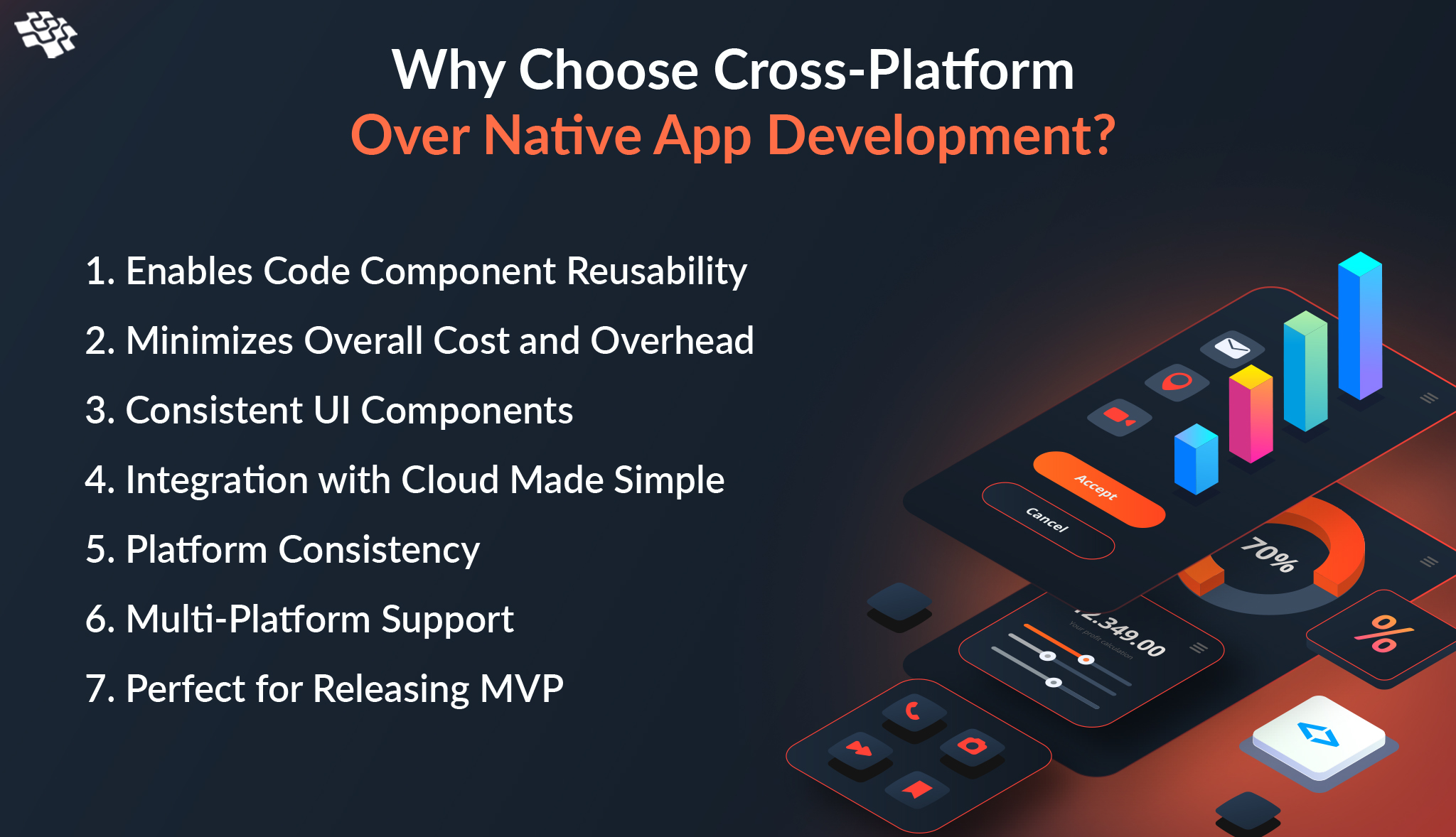7 Reasons to Choose Cross Platform App Development
By harnessing cross-platform app development, businesses can efficiently develop multiple applications economically and facilitate the development of hybrid apps compatible across Linux, Android, and iOS, ensuring competitiveness. Overall, cross platform mobile app development empowers businesses to establish their digital presence effectively and competitively.

Boost Performance Now! Harness Our Cross Platform Expertise for Optimal Operating System Compatibility!

“Cross-platform app development frameworks provide a unified development environment and set of libraries that enable developers to develop mobile applications that can run on various platforms, utilizing a single codebase.” – Persistence Market Research
Cross Platform App Development: Detailed Overview
Mobile app development comes in two types: native and hybrid. Native app development involves developing apps specifically for iOS, Android, and Windows platforms, necessitating expertise in multiple programming languages and SDKs. This often means maintaining separate codebases for each platform. In contrast, cross-platform mobile app development streamlines the process by allowing engineers to write code in a single language for multiple platforms, utilizing a unified codebase. Dart, utilized in Google’s Flutter framework, exemplifies this approach, simplifying the creation of mobile apps. While frameworks like React Native and Xamarin also offer these capabilities, Flutter stands out for its enhanced functionality and ease of use, making app development more accessible and efficient.
Why Develop a Cross Platform Mobile App?
Cross-platform mobile app development is widely adopted across industries for its efficiency in testing, scaling, and expediting product delivery. Utilizing these solutions proves advantageous, particularly during the development of mobile app prototypes or Minimum Viable Products (MVPs). This approach enables businesses to introduce their products to the market swiftly without exhaustive testing on specific demographics, conserving resources. Startups and large enterprises alike can leverage it to deploy MVPs for both iOS and Android users, refining the app based on user feedback. These apps facilitate gathering diverse usage data from a larger user base quickly and affordably, crucial for future expansion strategies. Regardless of company size or financial constraints, it offers invaluable insights for product enhancement and market growth. By streamlining the development process and maximizing reach, businesses can effectively bring their ideas to fruition and adapt to evolving consumer needs.
Native vs Cross Platform App Development
Native apps are tailored specifically to an operating system, meaning iOS apps won’t work on Android and vice versa. Developing native apps requires extra coding to create separate versions for each platform, increasing time and cost. These apps are written in languages optimized for their respective systems, like Objective-C or Swift for iOS and Java, C, or C++ for Android. However, in fast-paced development environments requiring language flexibility and speed, this approach may be limiting.
Cross-platform mobile app development offers a solution by generating a single-code application compatible with all platforms from the outset. While native apps excel in reliability, utilizing device features, and providing a responsive user experience, they also have drawbacks. They addresses these by streamlining the development process, potentially offering faster deployment and reduced costs while ensuring broad compatibility across platforms.
Why Choose Cross Platform Over Native App Development?
Businesses typically prefer cross platform application development over native app development for various considerations. Here are 7 of these:
 1. Enables Code Component Reusability
1. Enables Code Component Reusability
Cross-platform mobile app development involves creating a single codebase to build applications for both iOS and Android platforms. This approach consolidates the development process, allowing developers to implement features and functionalities once, ensuring consistency across platforms. By utilizing these frameworks, developers enhance efficiency and productivity, as they can leverage a unified codebase to create fully functional apps for multiple platforms simultaneously. Additionally, with a single codebase, developers can easily maintain and update the application across all platforms, ensuring consistency and reducing the risk of errors. Overall, cross-platform mobile app development offers a streamlined and cost-effective solution for businesses looking to reach a broader audience across various mobile platforms while maximizing development efficiency and productivity.
2. Minimizes Overall Cost
In the middle of the wave of activities aimed at digital transformation, not every company has the means to develop native apps for several platforms. Mobile applications play a pivotal role in delivering personalized messages, pivotal in contemporary internet-driven marketing strategies. Opting for cross-platform mobile app development mitigates the financial burden and technical complexities associated with adopting new technologies. This approach enables businesses to leverage a single codebase for developing applications compatible with multiple platforms, reducing development costs and streamlining the process. By embracing this, businesses can effectively bridge the gap between their technological aspirations and operational realities, facilitating smoother integration of mobile solutions into their operations. This not only enhances their ability to engage with customers through tailored mobile experiences but also enables them to stay competitive in an increasingly digital landscape without incurring excessive expenses or resource constraints.
3. Consistent UI Components
The UI components in cross-platform mobile app development ensure a cohesive user experience across platforms, mirroring the native app feel. By developing two distinct builds, users can smoothly navigate between pages without encountering glitches, fostering seamless interaction. This approach yields two separate packages tailored for both iOS and Android, each boasting consistent UI elements. As a result, customers enjoy a uniform interface and functionality regardless of the platform they’re using. This consistency enhances user satisfaction and simplifies the development process, as developers can focus on creating a unified experience rather than dealing with platform-specific nuances. Ultimately, this approach facilitates the creation of high-quality mobile applications that meet user expectations while optimizing development efficiency.
4. Integration with Cloud Made Simple
Cross platform app development frameworks facilitate effortless integration with cloud services, enabling seamless access to cloud resources. Furthermore, developers can readily incorporate third-party plugins and extensions into their applications, expanding functionality and enhancing user experience. This versatility ensures universal compatibility across multiple platforms, allowing the app to perform consistently regardless of the operating system it runs on. By leveraging cloud integration, developers can leverage scalable and reliable cloud infrastructure to enhance app performance and accessibility. Additionally, the ability to incorporate third-party plugins and extensions enables developers to extend the app’s capabilities beyond the core functionality provided by the framework. This approach not only streamlines development but also maximizes the app’s reach and potential.
5. Platform Consistency
Cross platform mobile app development enables engineers to maintain consistency in-app navigation while accommodating differences in UI and UX between iOS and Android. By ensuring that disparities are preserved, designers can work on app design seamlessly while ensuring a consistent user experience across platforms. This approach allows apps to effectively adapt to the unique design guidelines and navigation techniques of both iOS and Android, maximizing usability and user satisfaction. Therefore, cross-platform app development proves to be highly effective in scenarios where UI and UX requirements vary between different operating systems, as it allows for the creation of cohesive and user-friendly applications that cater to diverse platform-specific design conventions.
6. Multi-Platform Support
The primary advantage of cross-platform technology is its multi-platform support. For companies aiming for widespread user adoption, this is crucial. Cross-platform mobile app development facilitates releasing applications across various platforms and operating systems. This approach simplifies accessibility for consumers, ensuring they can easily find and use your software regardless of the platform they’re on, whether it’s Android, iOS, Linux, or others. By embracing it, companies can maximize their audience reach and enhance user engagement by providing consistent experiences across different devices and platforms. This not only increases the visibility and availability of the software but also enhances user satisfaction and loyalty.
7. Perfect for Releasing MVP
Experts advise businesses to begin with their Minimum Viable Product (MVP) due to its low-risk nature. Cross-platform mobile app development is particularly beneficial for startups as it’s deemed optimal for MVPs. By focusing on user preferences, additional features can be incorporated into the MVP over time, tailoring the app to user needs. This iterative approach allows for gradual refinement and enhancement of the product based on user feedback, ensuring it remains relevant and personalized. Therefore, startups can leverage this to launch their MVP swiftly, gather valuable user insights, and iteratively improve their app to meet evolving user demands. This strategy minimizes initial investment risks while maximizing the potential for long-term success in the competitive app market.
When Should Businesses Consider Using Cross Platform App Development?
Opting for cross platform mobile app development is the smartest move for businesses seeking to expand their audience. With this approach, your software becomes accessible across multiple platforms, ensuring widespread reach. Users will enjoy a consistent and seamless experience across different operating systems. This strategy is particularly beneficial for startups in the early stages of their project, as it allows for broad market exploration. If successful in reaching the target audience, the project can be scaled accordingly. Therefore, it offers a practical solution for businesses aiming to maximize their audience reach and lay a strong foundation for future growth and scalability. Nevertheless, here are the following situations where cross-platform mobile app development would be appropriate:
- When facing timing constraints and resource limitations, releasing on multiple platforms is essential.
- When catering to both iOS and Android users, maintaining a single codebase ensures consistency.
- When seeking complete control over UI elements and application logic, consider frameworks like Kotlin Multiplatform.
- When speed is crucial for MVP development and hypothesis testing, opt for cross-platform development for rapid implementation.
Wrapping Up
In today’s fiercely competitive market, mobile app development is crucial for business success. However, not all digital service providers may align perfectly with your business objectives. As an aspiring business owner, it’s essential to partner with a top-tier IT service provider for your app development needs. Choosing the right provider ensures that your applications are tailored to meet your specific requirements and effectively compete in the market. By collaborating with a reputable IT service provider, you can leverage their expertise and resources to develop high-quality cross-platform applications that resonate with your target audience and drive business growth. NextGen Invent, a leading cross platform mobile app development services company, utilizes advanced tools such as React Native, Flutter, Ionic, and more. Our team of experienced engineers helps businesses develop unparalleled applications, enabling them to capitalize on contemporary business opportunities and drive innovation.
Contact us if you’re looking for the best approach to develop your cross-platform application. We deliver excellent services and solutions tailored to your needs and goals.
Related Blogs

End-To-End Comparison of Flutter vs React Native
In today’s interconnected world, the demand for mobile apps has reached unprecedented heights, creating a fiercely competitive market. Consequently, the choice of development platform has become a topic of significant discussion.

A Step-by-Step Guide for Mobile App Development
In today’s world, smartphones have become ubiquitous, transcending geography and industries. It is universally acknowledged that engaging with consumers through mobile devices is the most effective way to capture their attention, generate interest in a brand, and drive sales.

The Ultimate Mobile App Testing Checklist
Mobile applications have become indispensable tools for businesses, providing a convenient and efficient means of delivering products and services to customers. To ensure a seamless customer experience, enterprises are heavily investing in mobile apps
Stay In the Know
Get Latest updates and industry insights every month.
 1. Enables Code Component Reusability
1. Enables Code Component Reusability